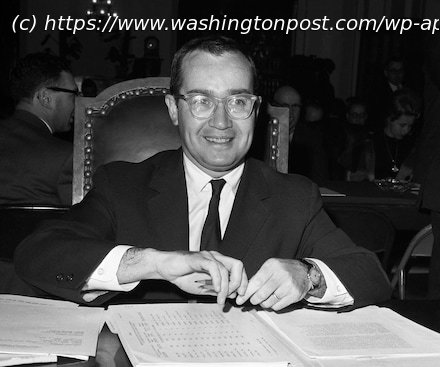He had towering impact on broadcasting by helping shape public television, satellite communications and presidential debates.
Newton N. Minow, the Federal Communications Commission chairman who in 1961 memorably assailed TV as a “vast wasteland” and went on to have a towering impact on broadcasting by helping shape public television, satellite communications and presidential debates, died May 6 at his home in Chicago. He was 97.
The cause was a heart attack, said his daughter Nell Minow, a top authority on corporate governance.
Mr. Minow was a politically connected Chicago legal grandee and boardroom Zelig whose professional life encompassed nearly every part of the communications business over six decades.
During World War II, he served in an Army battalion that built one of the first telephone lines between China and India. As a director of National Educational Television, a forerunner of the Public Broadcasting Service, he helped obtain the funding to put “Sesame Street” on the air in 1969. He later sat on the boards of CBS, the Tribune Co. and other major broadcasters, and he chaired the PBS board in the late 1970s.
Through prominent roles on panels and commissions, Mr. Minow also worked to create a template for the modern presidential debate format that has conferred on television a defining role, beyond political advertising, in the electoral process.
Ron Simon, a curator at the Paley Center for Media in New York, called Mr. Minow “a crucial figure in expanding TV’s possibilities.”
A former clerk for the chief justice of the United States, Mr. Minow had a quick and farsighted mind that in the 1950s helped him advance into the inner circles of Democratic presidential candidate Adlai E. Stevenson II, the onetime Illinois governor, and John F. Kennedy, then a U.S. senator from Massachusetts. Two generations later, Mr. Minow helped promote the political rise of future President Barack Obama, who had been a summer associate in Mr. Minow’s Chicago law firm.
Mr. Minow was initially thrust into national attention as FCC chairman from 1961 to 1963, when he emerged as one of the boldest and most ambitious of President Kennedy’s New Frontiersmen.
The FCC mostly focused on issuing licenses for radio and television stations and setting rates for phone service, but Mr. Minow saw the job as a pulpit from which to evangelize for the public interest.
After all, he reasoned, the public owned the airwaves. And he had long been concerned — as a parent and as someone who understood TV’s ability to sway minds — by the proliferation of what he considered shallow, dollar-grubbing programming by the networks.
At 35, Mr. Minow was one of the youngest men ever to hold the FCC chairmanship when President Kennedy rewarded him with that assignment in 1961. At the time, the regulatory agency was reeling from payola scandals, involving bribes paid to disc jockeys in exchange for promotion of certain records, and rigged quiz shows. A popular joke was that the FCC’s initials stood for From Crisis to Crisis.
The FCC also was perceived to have been in the pocket of lobbyists and broadcast industry leaders. A chairman was forced to resign in 1960 after accepting a six-day cruise on the yacht of a radio and TV company president.
Mr. Minow set out to revive the agency as a watchdog.
In his first public address as FCC chairman, on May 9, 1961, he delivered a majestic bombshell at the National Association of Broadcasters convention in Washington. Mr. Minow and his speechwriters borrowed from the poet T.S. Eliot and created an enduring catchphrase about the “vast wasteland” of the tube.
“When television is good, nothing — not the theater, not the magazines or newspapers — nothing is better,” he said. “But when television is bad, nothing is worse. I invite each of you to sit down in front of your television set when your station goes on the air and stay there, for a day, without a book, without a magazine, without a newspaper, without a profit and loss sheet or a rating book to distract you.
Home
United States
USA — mix Newton Minow, FCC chairman who assailed ‘vast wasteland’ of TV, dies at...






